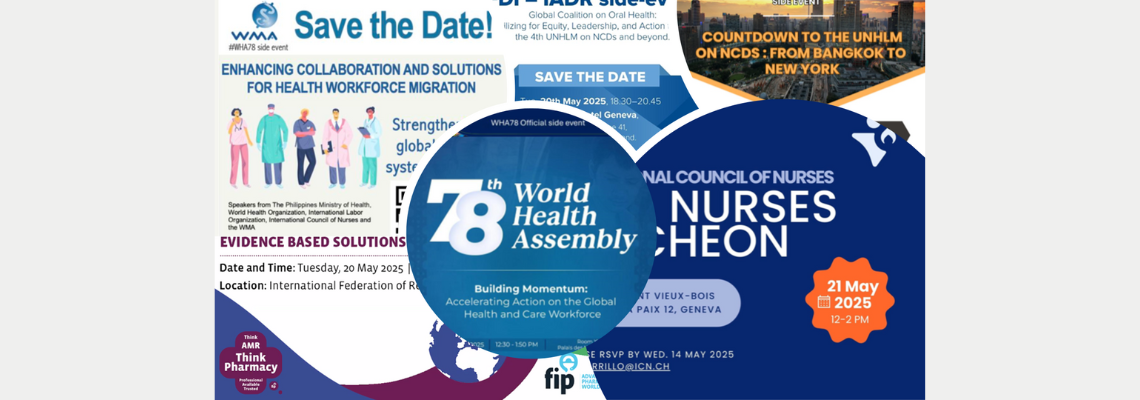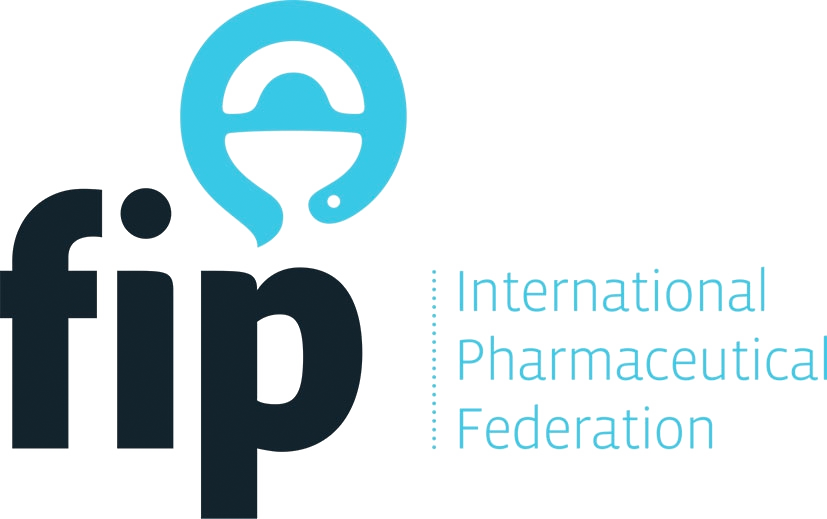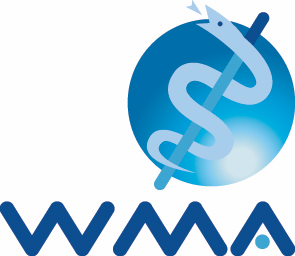
WHPA member organizations hosted 6 side events at WHA78
28 May 2025—At what is widely being referred to as a “historic” 78th World Health Assembly, WHPA and its member organizations called on delegates to recognize that the health workforce continues to be the backbone of all health care, even as policy makers respond to drastic budget cuts and increasing workforce shortages.
Held from 19-27 May 2025, WHA78 was the site of highs and lows, the biggest high being the adoption of the Pandemic Agreement—3 years in the making, but nevertheless a win for multilateralism and international solidarity. The low point was arguably the US withdrawal from WHO and the subsequent funding shortfall, making talk of sustainable financing and new global health landscapes dominate proceedings.
The professions stepped into this arena with the aim of making sure that the health workforce was not the forgotten component in the remaking of global health. To this end, WHPA hosted a well-attended side event reaffirming a critical message: investing in health professionals is not a cost, but a cornerstone of resilient, high-quality healthcare systems and the path to universal health coverage. Leaders of the 5 WHPA member organizations delivered powerful keynotes, urging policy makers to build a resilient health workforce and strong health systems, with a focus on making international health workforce recruitment fair and accountable, and positioning health professionals as leaders on climate change action.
Full house at the WHPA side event. Photo: Janice Blondeau
High visibility of health professionals at WHA78
WHPA members hosted a total of 6 side events in this critical year, a mark of how high engagement was in the global health community at WHA78. WMA hosted an official side event, reintroduced this year by WHO as renovations in the Palais des Nations, the UN’s European Headquarters where the WHA is held, had been completed. Cooperation between WHPA members also took the form of inviting colleagues from each others’ organizations as speakers. Side events included:
- Countdown to the UNHLM on NCDs: From Bangkok to New York; 19 May; Hosted by Malaysia and co-sponsored by Bahamas, Egypt, France, Philippines, Thailand, NCD Alliance, University College London and FDI
- Global Coalition on Oral Health: Mobilizing for Equity, Leadership and Action towards the 4th UNHLM on NCDs and Beyond; 20 May; Organized by FDI and IADR
- Pharmacists and Pharmacy – Evidence Based Solutions to Global Threats; 20 May; Organized by FIP
- WHA Nurses Luncheon; 21 May; Organized by ICN
- Enhancing Collaboration and Solutions for Health Workforce Migration; Strengthening Global Health Systems for UHC; Organized by WMA
- OFFICIAL SIDE EVENT: Building Momentum: Accelerating Action on the Global Health and Care Workforce by 2030; 20 May; Co-hosted by the Philippines, Germany, Ireland, Morocco, WMA and the Frontline Health Workers Coalition.
As well as hosting their own events, WHPA members’ leaders were invited to speak at over 12 other side events, making the voice and the concerns of the professions heard throughout this extraordinary gathering of the global health community over a wide range of topics: from AMR, NCDs, digital health, and self-care to health worker migration and sustainable development goals (SDGs), reinforcing the health-workforce component which is at the heart of all health care. WHPA members partnered with health NGOs like the World Heart Federation and the International Patients’ Union; they collaborated with UN agencies like International Telecommunications Union and WHO; and their events were sponsored by countries as diverse as Bahamas, Egypt, France, Germany, Indonesia, Ireland, Japan, Jordan, Morocco, Philippines, Romania, and Thailand.
Joining the debate: WHPA statements to WHO Member States
In the official WHA proceedings, WHPA made 2 constituency statements to WHO delegates on strategically important topics: UHC, which is threatened by ongoing budget cuts, and strengthening the global architecture for health emergencies, given the need to maintain the focus on the issue now that the pandemic agreement has taken the first hurdle towards implementation. WHPA’s statement on climate change was presented by WMA as an individual statement and focused on the need for a strong health workforce to secure everyone's health now and in the future.
WHPA member organizations made a series of individual interventions to delegates throughout WHA, making hard-hitting statements highlighting the professions’ perspective on the following agenda items:
- 13.1 Non-communicable diseases: diabetes and oral health
- 13.2 Mental health and social connection
- 13.5 Substandard and falsified medical products
- 13.7 Health and care workforce
- 13.9 Global strategy for Women’s, Children’s and Adolescents’ Health
- 14. Health in the 2030 Agenda for Sustainable Development
- 15. Antimicrobial resistance
- 16.2 Intergovernmental Negotiating Body to draft and negotiate a WHO instrument on pandemic prevention, preparedness and response
- 17.3 Health conditions in the occupied Palestinian territory, including east Jerusalem
- 18.2 Updated road map for an enhanced global response to the adverse health effects of air pollution
- 24.2 Global strategies and plans of action that are scheduled to expire within one year
Health workforce resolution adopted
For the health professions, it was encouraging to see the Resolution “Accelerating action on the global health and care workforce by 2030” adopted, after surviving an newly introduced resource prioritization process ahead of the World Health Assembly.
In the Resolution, member states committed to increasing investment in human resources for health and also to addressing sustainably shortages in education, training and employment capacity while maintaining high educational standards.
While Resolutions are not legally binding, they reflect political consensus and set priorities. The fact that this Resolution was passed despite current resource constraints can make it a useful tool for NGOs to persuade policy makers to take action, or call them to account.
Image credit for collage: WHPA Secretariat; Photo credit for thumbnail: WHO




